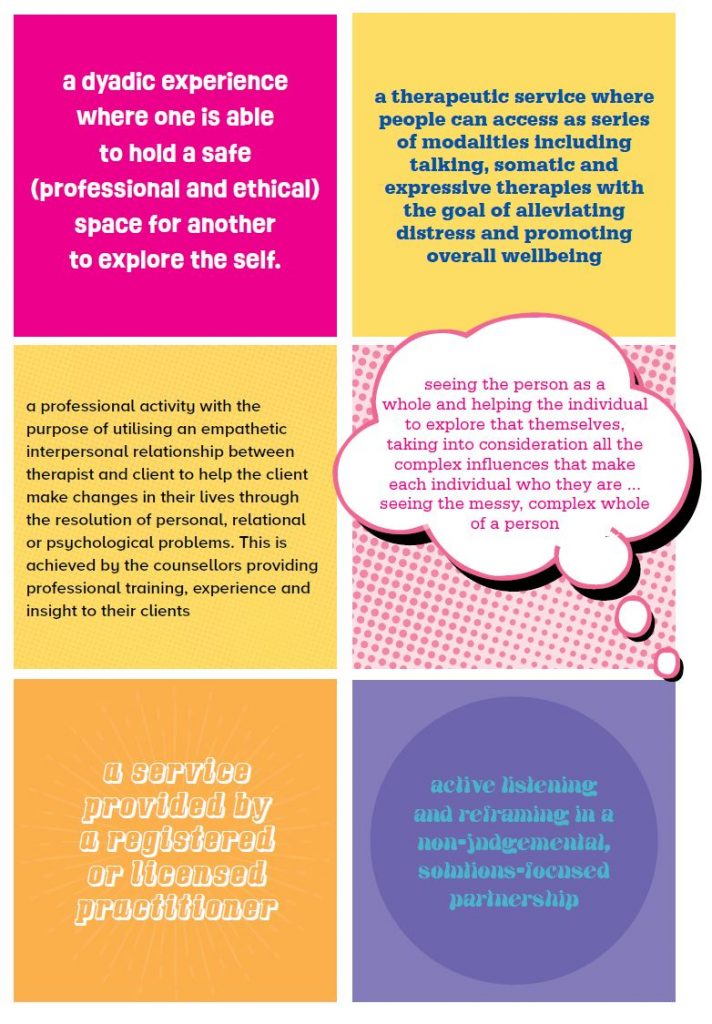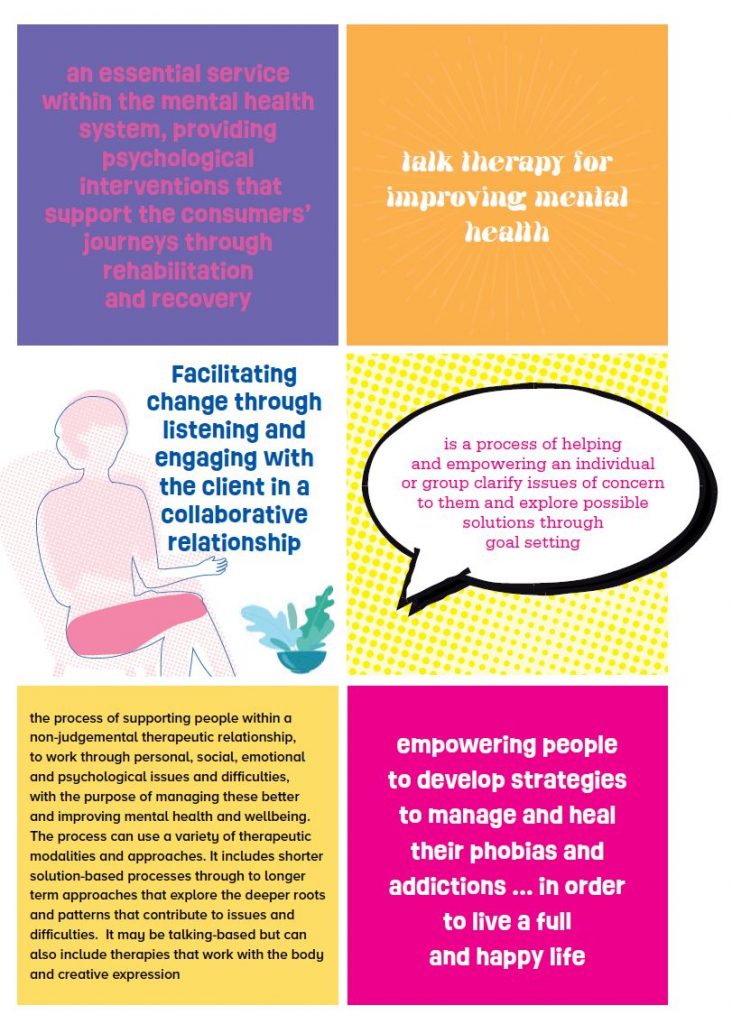As featured in the Counselling Australia Journal Summer 2023, Vol 23 No 1.
By Melissa Marino
Healthy diet is now established as a key pillar of mental health. We spoke with Alfred Deakin Professor Felice Jacka OAM, the founder and driving force of ‘nutritional psychiatry’, about the role this growing field of scientific research can play in counselling and psychotherapy to improve the quality and length of people’s lives.
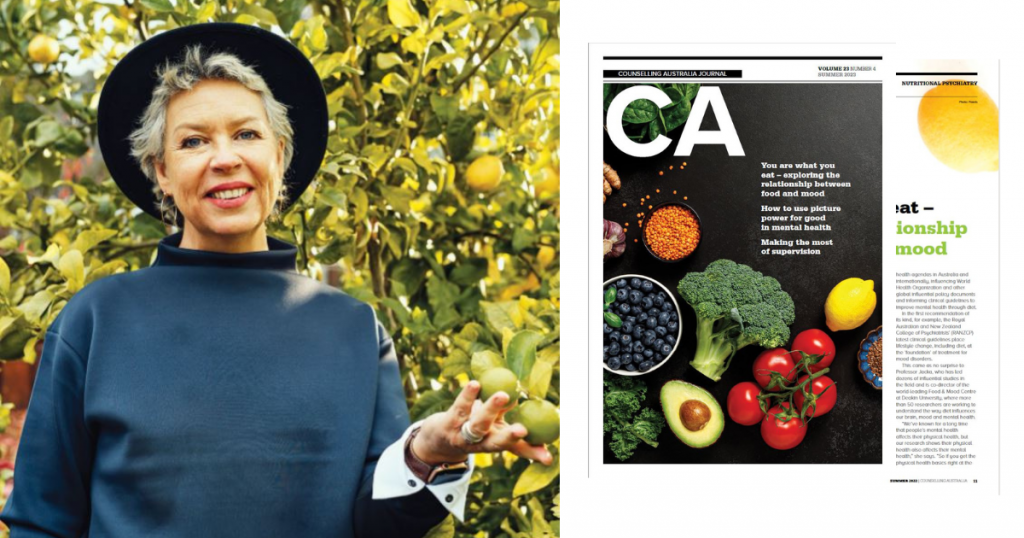 When Professor Felice Jacka embarked on her PhD – the first study of its kind investigating the link between diet quality with clinical depressive and anxiety disorders – it raised a few eyebrows.
When Professor Felice Jacka embarked on her PhD – the first study of its kind investigating the link between diet quality with clinical depressive and anxiety disorders – it raised a few eyebrows.
“Everyone thought I was a bit barmy because it was just not considered credible or worth looking at,” she says.
But little more than a decade after her research was published with great acclaim on the cover of the American Journal of Psychiatry, her conviction has been vindicated many times over. “I always knew there was something in it, so it’s very satisfying to be able to say, ‘I told you so’,” laughs Professor Jacka, who in 2021 received an OAM for her extensive body of work.
Today, Professor Jacka sits at the helm of nutritional psychiatry – a burgeoning field that she is widely credited with founding and that is now setting health agendas in Australia and internationally, influencing World Health Organization and other global influential policy documents and informing clinical guidelines to improve mental health through diet.
In the first recommendation of its kind, for example, the Royal Australian and New Zealand College of Psychiatrists’ (RANZCP) latest clinical guidelines place lifestyle change, including diet, at the ‘foundation’ of treatment for mood disorders.
This came as no surprise to Professor Jacka, who has led dozens of influential studies in the field and is co-director of the world-leading Food & Mood Centre at Deakin University, where more than 50 researchers are working to understand the way diet influences our brain, mood and mental health.
“We’ve known for a long time that people’s mental health affects their physical health, but our research shows their physical health also affects their mental health,” she says. “So if you get the physical health basics right at the foundation, other forms of treatment are more likely to work.”
Professor Jacka believes the relatively new discipline of nutritional psychology has gained so much traction in such a short timeframe because it puts the power of transformation in people’s hands. Unlike static risk factors for mental health disorders, such as early life trauma or genetics, people can take control and change their diets. “So for people to understand that they have some agency in modifying this risk factor is very powerful and it’s of great interest,” she says.
Evidence base
Supporting the elevation of diet (along with other lifestyle factors such as physical activity, sleep and substance cessation) into mental health policies and guidelines is a growing amount of clinical research pointing to the critical role food plays in our mental wellbeing.
“It used to be that psychiatry and psychology thought about the mind and body as being separate, but we now know we are one complex, highly integrated system,” Professor Jacka says. There is now a comprehensive evidence base linking the quality of people’s diets to their risk for depression, she says. This begins from the very start of life – from diet in utero to childhood, adolescence and adulthood.
When multiple studies are combined it appears that, on average, people who have a healthier diet reduce their risk of developing depression by 30 to 35 per cent, she says, and this is independent of important factors such as education, income and body weight. Importantly, the research also shows that diet is not only a predictor of mental ill-health, but also is proven as a treatment for mood disorders such as depression.
And this holds great promise for health professionals in informing their own practice and providing options as waiting lists for therapy blow-out. “Clinicians won’t do their patients a disservice if they refer them to a dietitian while they’re waiting see a counsellor,” she says.
The Food & Mood Centre’s internationally recognised SMILEs trial – the first randomised controlled trial looking at dietary improvement as a treatment for depression – found diet had a significant impact on mental health. The trial, published in BMS Medicine, found that when supported by a clinical dietitian, one third of participants (all who were diagnosed with moderate or severe clinical depression) went on to achieve full remission.
“It’s very powerful for people who are experiencing a major depressive disorder that we saw very large changes in people’s mental health from dietary change,” Professor Jacka says. Importantly, this did not arise from weight loss or other potential explanations. This finding has now been replicated in three other randomised controlled trials.

Real-world impact
Findings of this nature are important because people’s lives are at stake, she says.
Poor diet is the leading cause of early death around the world, she says. And on top of that, there is a startling 20-year mortality gap between people with and without a mental health disorder.
“And that’s not because of suicide,” she says. “It’s because of poorer cardiometabolic health related to medications, and the fact that they are often treated as if they are just a brain on legs and their physical health is not considered to be particularly clinically relevant. And often they do not have the support to choose healthy foods or get moving.
“Clinical practices are traditionally some of the worst offenders, she says. In-patient clinics provide sweet muffins as snacks, fast food is ordered in and there are smoking areas and a lack of physical exercise programs. But, she says, with appropriate support, improvements can be swift and significant.
In Sydney, the Keeping the Body in Mind group showed that with minimal intervention (a student dietitian, exercise physiologist and second-hand gym equipment), people commencing anti-psychotic treatment, who would usually be expected to gain between seven and 20 kilograms, maintained a stable weight.
Professor Jacka’s research has also shown that using mental health as a goal has a more profound effect on people’s eating habits than using weight loss or heart health as a motivator.
“Body weight is a silly thing to focus on because it’s very difficult to change. People give up and feel stigmatised. So focussing on the fact that people’s mental health could be affected very quickly based on dietary change seems to prompt changes in dietary behaviours,” she says.
In line with the understanding that changes in diet can improve gut health quickly, benefits to mental health can be seen in as little as three weeks, she says.
How it works
Professor Jacka explains that our mental health is affected by diet through a number of physiological mechanisms that researchers are continuing to work to understand.
Diet influences the hippocampus – the ‘plastic’ part of the brain responsible for learning and memory as well mental health – and serotonin levels, mitochondrial function that enables stress adaptation, the expression of genes, oxidative stress and inflammation.
Linking all these factors and profoundly influenced by what we eat, she says, is our gut microbiota. In breaking down the food we eat, our unique gut microbiota release thousands of molecules that drive physiological processes in our bodies, including those related to our mental and brain health. So a healthy gut microbiota appears essential to our mental health.
A healthy gut microbiota requires a higher intake of plants, whole foods, quality fats and proteins and some fermented foods, and lower intake of ultra-processed foods.
And the key, Professor Jacka says, is diversity. People can develop a diverse gut microbiota by eating 30 different types of plants per week. They don’t have to be exotic, she says, just wide in a variety of fruits, vegetables, grains, legumes, nuts, seeds, herbs and spices.
Myth-busting a common misconception, Professor Jacka says a healthy diet does not have to be expensive. A cost analysis showed that in the SMILEs trials, healthy but accessible foods such as frozen vegetables, tinned beans and fish were cheaper than junk food-heavy diets participants had been consuming.
“So even though the brain and the gut microbiota are very complex, what you need to do to have a healthy gut microbiota is actually pretty simple,” she says.
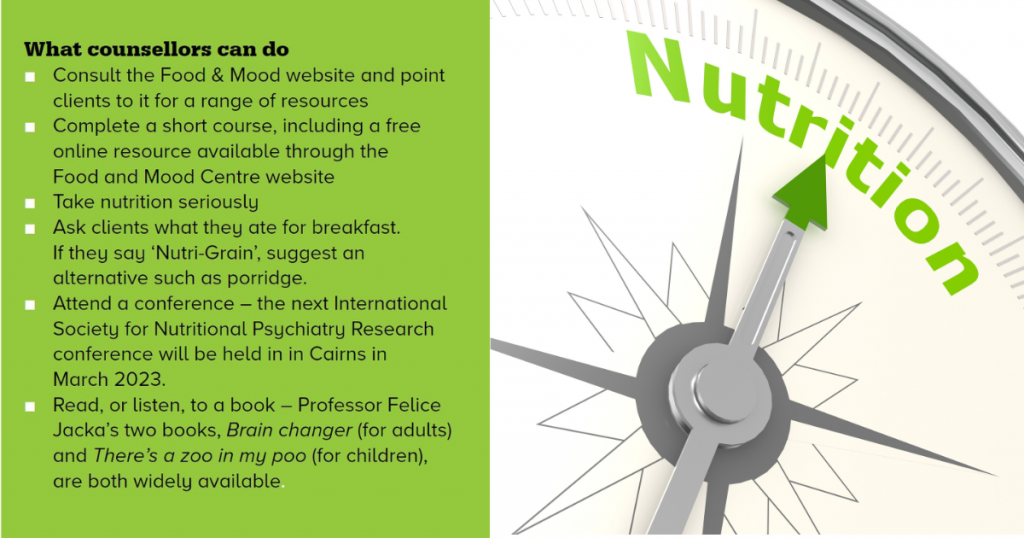
New paradigm
The function of gut microbiota in relation to mental health is now under the microscope at the Food & Mood Centre.
Researchers are investigating the impact of fermented dairy on the brain; future research hopes to investigate nuts, mushrooms, herbs and other fermented food such as kombucha and sauerkraut that contain components that could be important in psychiatric disease.
Other research at the centre is comparing diet and exercise programs with cognitive behaviour therapies and the role of apps to treat depression through dietary education and improve diets in pregnancy and childhood.
The centre has also just published the first set of international guidelines for therapists using lifestyle-based care in treatment for depression, based on three years of research by the global taskforce it led.
Professor Jacka’s team is at the forefront of translation working with RANZCP to develop Nutri-Psyche – the world’s first accredited training program in nutritional psychiatry. Launched in October 2022, it follows a free online course available on the Food & Mood Centre website that has been accessed by more than 78,000 people globally.
To enhance cooperation, Professor Jacka, as the founder and president of the International Society for Nutritional Psychiatry Research, also sits on the World Economic Forum’s new nutrition initiative designed to counter the global industrialised food system that costs the economy $11 trillion a year in health impacts.
It has been a relentless workload, and not without personal cost. Professor Jacka has battled two bouts of breast cancer and is now actively trying to say ‘no’ to more – “which is hard when you’re the face of nutritional psychiatry,” she says. Professor Jacka’s work has graced the cover of TIMEmagazine, among others, and she has featured in international documentaries, as well as ABC TV programs Catalyst and Magda’s Big National Health Check.
She’s the first to admit she has not always prioritised her own mental health but is now addressing that by prioritising sleep, walking near her coastal home and easing her workload as she focuses in the “important things” – mentoring and getting new ideas off the ground.
Above all, she says the challenges have been worth it. “Not many people get to say that they achieved what they set out to do in their career, and I did. And I hope it’s going to help a lot of people.”
References
1. Chen, Y., Xu, J., & Chen, Y. Regulation of neurotransmitters by the gut microbiota and effects on cognition in neurological disorders. Nutrients. 2021 Jun 19;13(6):2099.
2. Stephen, A.M., & Cummings, J.H. The microbial contribution to human faecal mass. Journal of Medical Microbiology. 1980 Feb 1;13(1):45-56.
3. O’Grady, J., O’Connor, E.M., & Shanahan, F. Dietary fibre in the era of microbiome science. Alimentary pharmacology & therapeutics. 2019 Mar;49(5):506-15.
4. Young, V.B. The role of the microbiome in human health and disease: an introduction for clinicians. Bmj. 2017 Mar 15;356.
5. Mohajeri, M.H., Brummer, R.J., Rastall, R.A., Weersma, R.K., Harmsen, H.J., Faas, M., & Eggersdorfer, M. The role of the microbiome for human health: from basic science to clinical applications. European journal of nutrition. 2018 May;57(1):1-4.
6. Martyniak, A., Medyńska-Przęczek, A., Wędrychowicz, A., Skoczeń, S., & Tomasik, P.J. Prebiotics, probiotics, synbiotics, paraprobiotics and postbiotic compounds in IBD. Biomolecules. 2021 Dec 18;11(12):1903.
7. Bonaz, B., Bazin, T., & Pellissier, S. The vagus nerve at the interface of the microbiota-gut-brain axis. Frontiers in neuroscience. 2018 Feb 7;12:49.
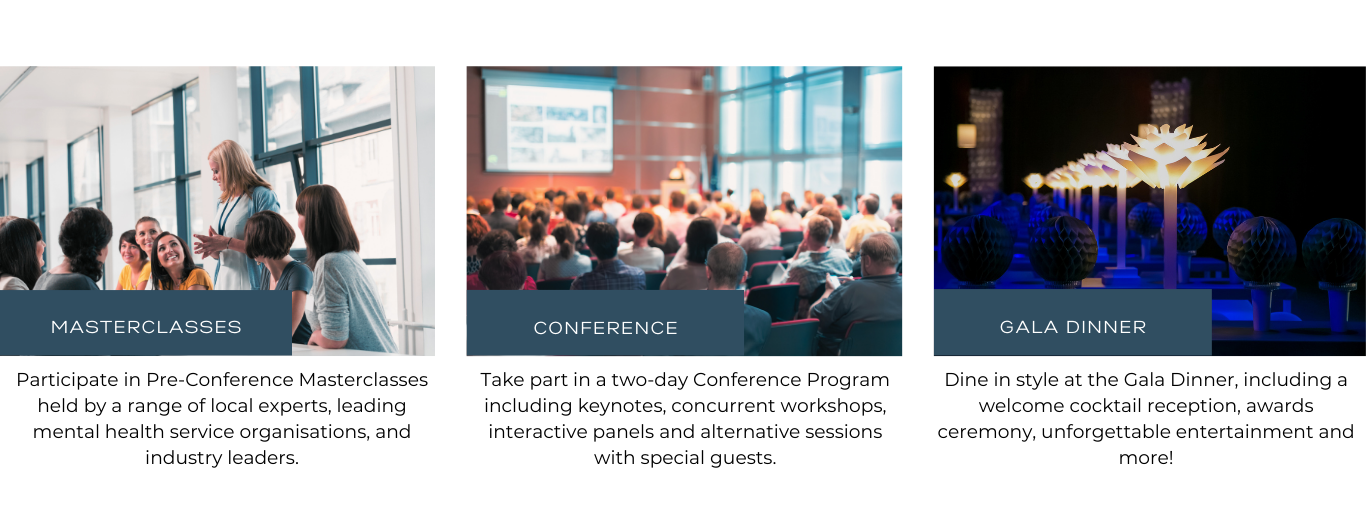
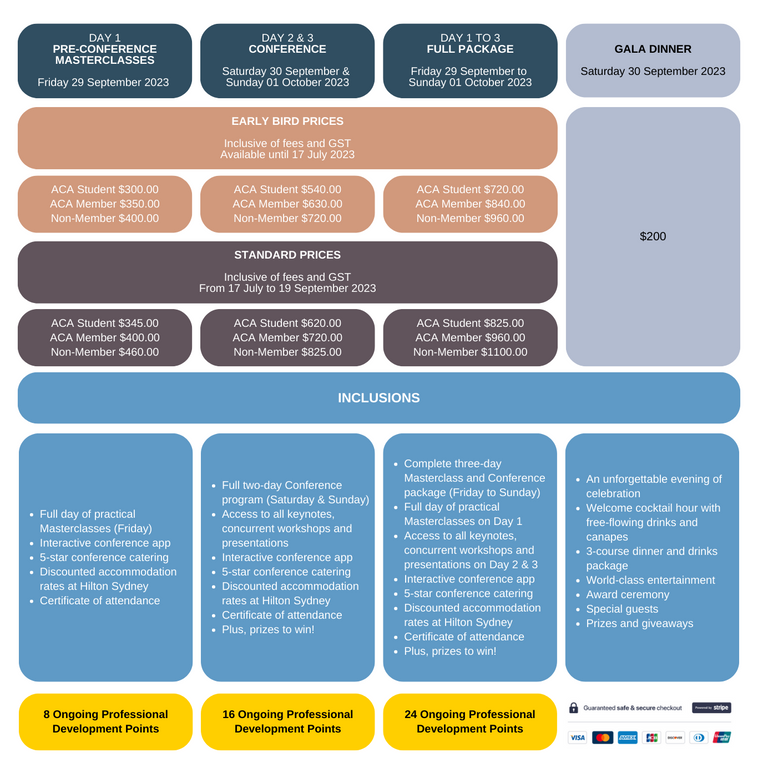

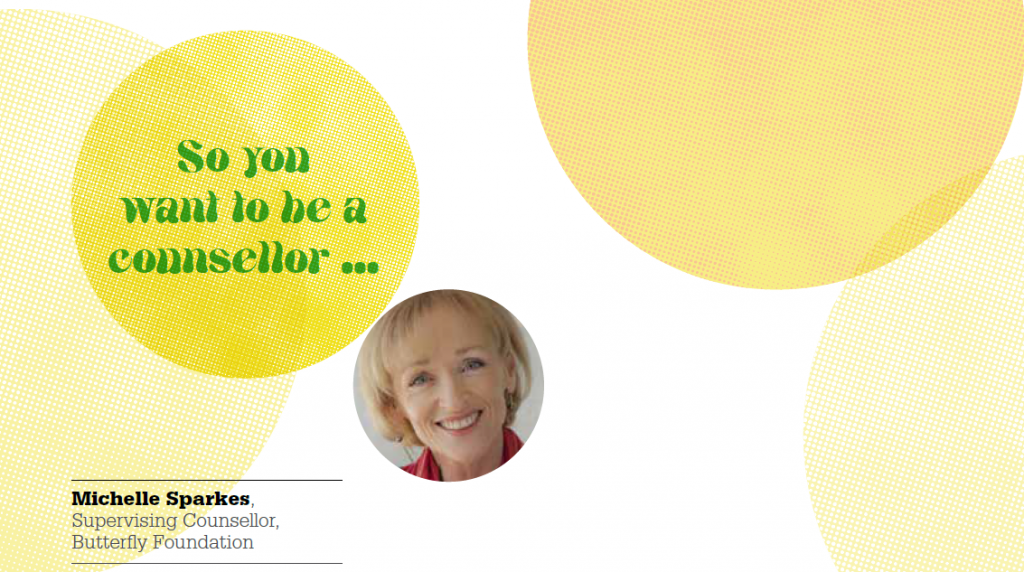


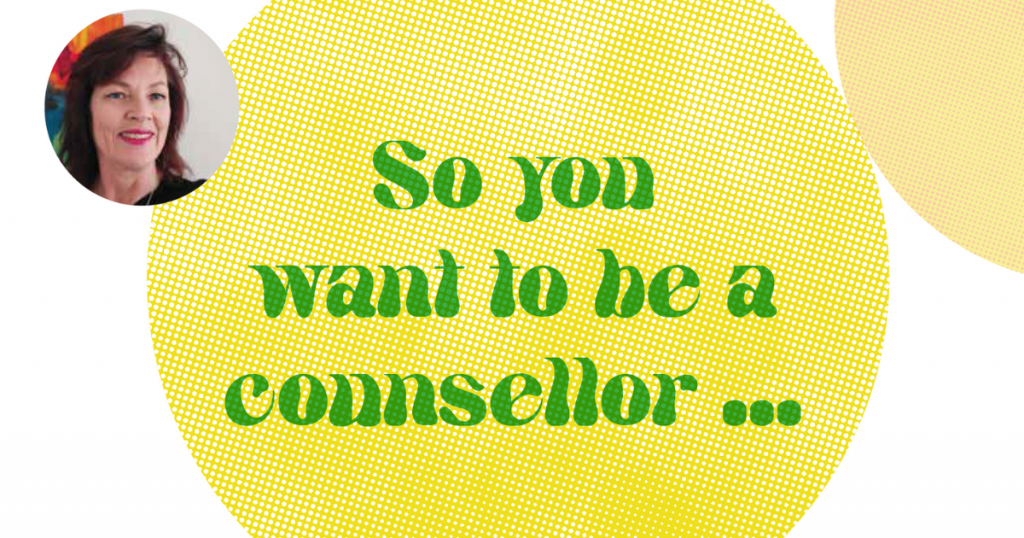
 When Professor Felice Jacka embarked on her PhD – the first study of its kind investigating the link between diet quality with clinical depressive and anxiety disorders – it raised a few eyebrows.
When Professor Felice Jacka embarked on her PhD – the first study of its kind investigating the link between diet quality with clinical depressive and anxiety disorders – it raised a few eyebrows.



